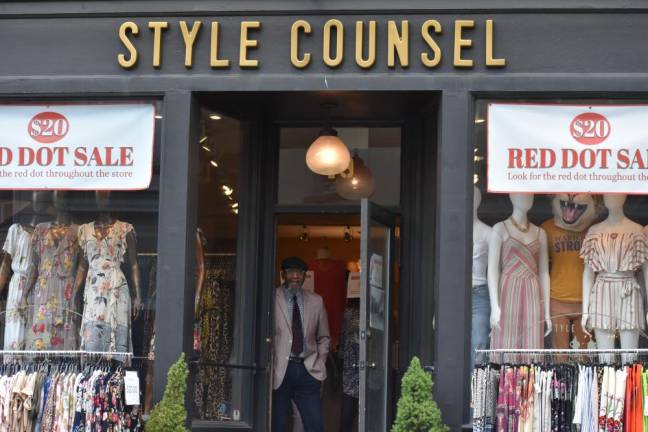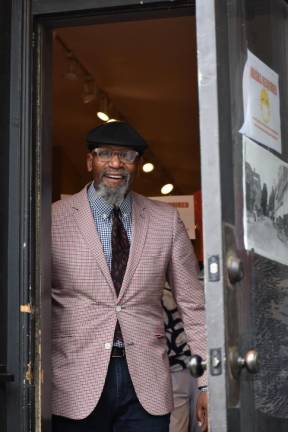Shopkeepers reopen to healthy, even record, sales
Shopping. But between the unpredictability of both the virus and the supply chain, Main Street retailers brace for whiplash.



The future of local retail? “That’s a good one,” laughs Bob Maxwell in his baritone, before excusing himself as “the quiet one” and passing me off to his partner, Tim Mullally, with whom he owns Style Counsel in Warwick, N.Y. Because who can know?
What shopkeepers do know is that since they have been allowed to re-open, business has been brisk. Between pent-up demand to go out and sluggish shipping times from online retailers, brick and mortar is having a moment. How long it will last is anyone’s guess.
Style Counsel, Warwick N.Y.
“We’re actually really surprised and excited about the business we’ve been doing,” said Mullally. “The only thing that’s different is that people are wearing masks. It’s a crazy thing, people are coming in, shopping, and spending money.”
But behind the scenes, the rhythms of commerce are all out of whack. Style Counsel had to fire-sale its spring collection to make room for summer pieces. “Because our merchandise is somewhat perishable, being closed for three months we have no choice but to slash our prices and get stuff out of here,” said Mullally.
“Right now, of course, there’s so much uncertainty – what the hell? Is this thing coming back or did it end?” he said. “Everything is so up in the air that we have to be really careful too with our buying and what we’re bringing in. It’s going to be a very interesting, challenging time for us retailers to navigate how we need to service our customers and, at the same time, our own understanding of supply and demand and how it’s going to work.”
Maxwell, sharply dressed in a checked blazer and jeans, beret, and checked mask, paused while dressing a mannequin on a Monday morning to greet a customer. The blonde middle-aged woman fingered clothes on hangers, a simple act that now seems almost decadent. She shook her head. No, she decidedly did not want to be interviewed about local retail – “except that I hope it’s coming back,” she said.
It has a long way to go. Months of being shuttered has dealt mom-and-pop shops a body blow that put some out of business, like secondhand boutique Random Acts of Consignment in Florida, N.Y., and Linda’s Office Supplies in Goshen, N.Y., which is closing on July 20 after 34 years in business. But the ones left standing have their fingers crossed.
“I’ve heard from people in the industry there will be a resurgence in smaller mom-and-pop stores – the ones that are still around – because of the fact that people are feeling safer in less crowded environments,” said Mullally. “People do feel in our village a sense of safety. Boutique shopping, I’m predicting, is going to be stronger because people don’t want to be in large stores with a lot of other people.”
Pike County Outfitters, Milford, Pa.
Ted Metzger, owner of Pike County Outfitters, in Milford, Pa., said, “It’s going to be easily my busiest month on record in 24 years of business.”
While he was shut down, Metzger put a cooler of live bait on the porch for his regulars, and some fishing accessories on the honor system with a drop box, whose proceeds for the month of April went to the Milford Fire Department. “Every week, it was a little bit positive,” he said. “People put in extra money.” He was glad to do what he could to boost the community, but it didn’t help pay his bills as trout season passed him by.
The “over the top” sales that greeted his reopening come as a reprieve from the painful two-and-a-half-months that preceded it. “I’ll just say ‘sickening’ would be the best way to put it,” he said of the shutdown. For small outfits like his, even going full tilt probably can’t make up for a season’s lost sales.
Still, Metzger is grateful for the spike. His brother owns Apple Valley Restaurant right next door. “They’ve probably taken the worst hit out of anybody, next to maybe a movie theater or mall,” said Metzger of restaurants. “And now they’re open, and they’re struggling to get employees.”
Metzger opened his door to find that Pike County Outfitters was kind of the only game in town, at least for the moment. Swamped online retailers are behind on shipping, and Walmart’s fishing department – which stayed open throughout the pandemic – has been picked clean, he said. What’s more, he “100 percent” agrees with Mullally that people feel safer in his neatly tended shop, with its stone chimney and spacious porch. “I’ve been told over and over it’s the cleanest sporting goods store in the Northeast,” he said. “It’s just tidy, always has been.”
The act of stepping into a store, too, is woven into our very nature. Shopkeeping is one of humanity’s oldest professions. We’ve been interacting this way, through the physical medium of coinage, for many thousands of years. Clicking away in your pajamas just doesn’t scratch the itch.
“I think what happened during the pandemic, people ordered a lot of stuff online and realized there’s very little enjoyment with that,” said Metzger. “I think they did realize there’s pleasure coming into a nice store like mine supporting local, seeing kind of what’s new and enjoying the experience.” Key to his longevity is his ability to compete with online and big box retailers by keeping overhead low, he said. He runs the shop with one employee. “You know, you have to be kind of frugal, know your margins, and understand that the consumer nowadays is very savvy,” he said, “They can look up pricing instantly with their phone. You have to be competitive.”
Now he finds himself running into the same problems as all the other outfitters: fishing and boating gear is flying out of the store faster than he can get new inventory. Back-to-back shipments of 15 kayaks apiece have been completely pre-sold. That might be a good problem to have, except that he’s been getting emails from mainstay suppliers like Columbia Sportswear, warning that for 2021, “we are going to get 50 to 60 percent of pre-booked products.”
“They’re canceling fleeces, coats, things that just can’t get manufactured,” said Metzger. He expects that, come August, it’ll be tough to get fishing tackle. Come winter, he’ll be out of snow gloves.
A lifelong outdoorsman, Metzger, has been at this long enough to be able to see the long game. “I’m grateful, I had a record June, but I definitely see it kind of slipping,” he said. “The supply chain’s gonna hurt.”
The spending frenzy will die down, too, Metzger expects. The hordes of city folk flooding Milford and his store will eventually disperse, malls and movie theaters will reopen, and driving to the store will lose some of its newfound luster. “Will the consumer get lazy again and order online? Of course they will,” he said. “Of course they will.”
Famous Brand Shoes, Newton, N.J.
People want to be able to pick up their stuff now, said Tina Timmel, owner of Famous Brand Shoes in Newton, N.J. “I think that’s what’s driving decent traffic flow, not having to wait maybe 14 days or even a week to get something,” she said.
For 36 years, the family-owned store has filled a simple but increasingly underserved niche: measuring and fitting customers for shoes. “We have a sales staff that actually talks to people, and we pride ourselves on that,” said Timmel, who took over the store from her dad.
This kind of longevity doesn’t happen by accident. Stores that make it through rough patches have one thing in common. “I think if you’re a smart business person, you’ll have some money saved to survive,” said Timmel. Those reserves are built up slowly, sometimes over generations, but they can be drained fast.
“Economically we will never recover what we lost,” she said of the shutdown. “No matter what we do in the future, the losses that we sustained will never be regained.”
Famous Brand Shoes saw a surge on June 15, the day non-essential retail was allowed to reopen in New Jersey. Traffic flow had subsided to a normal pace by the end of the month as everyone who needed shoes got shod. Now, Timmel is looking forward to the annual arrival of summer vacationers and campers who flock to Sussex County campsites.
Customers have been telling her how happy they are that she’s open – but she knows it’s not just her. “Kohl’s was very, very busy, and they’re a few doors down from me up the hill, and they have a lot of shoes in their shoe department,” she said.
Notwithstanding best intentions to support local businesses, customers no longer have loyalty to particular stores like they once did, said Timmel. “They want what they want,” she said. “If they can’t find it here, they’re going to go somewhere else to look for it.”
That’s a bit worrisome, as small retailers struggle to secure new products, or even straightforward answers, from suppliers in the wake of the shutdown. “One of our number one spring brands, Crocs, has been a nightmare,” she said.
Like Metzger, Timmel expects that some of the folks she’s seeing now will turn out to be fair-weather customers. When online retailers get back up to speed, she said, “we’ll see where the trend goes.”
Curveballs are a fact of life for small business owners, whose job it is, nevertheless, to play Nostradamus. They must peer a couple seasons or even a year down the road, and make their best guess about how much of what to order. “To be honest, I can’t think too, too far in the future,” said Timmel. “I feel that even with some of our biggest brands, I will be able to get product when I need it. I just need to be better at planning, maybe bringing spring 2021 into the store a little earlier, but maybe not bringing as many styles in. Because what if this happens again?”
“What happened during the pandemic, people ordered a lot of stuff online and realized there’s very little enjoyment with that. They did realize there’s pleasure coming into a nice store like mine supporting local, seeing kind of what’s new and enjoying the experience.” --Ted Metzger, Pike County Outfitters